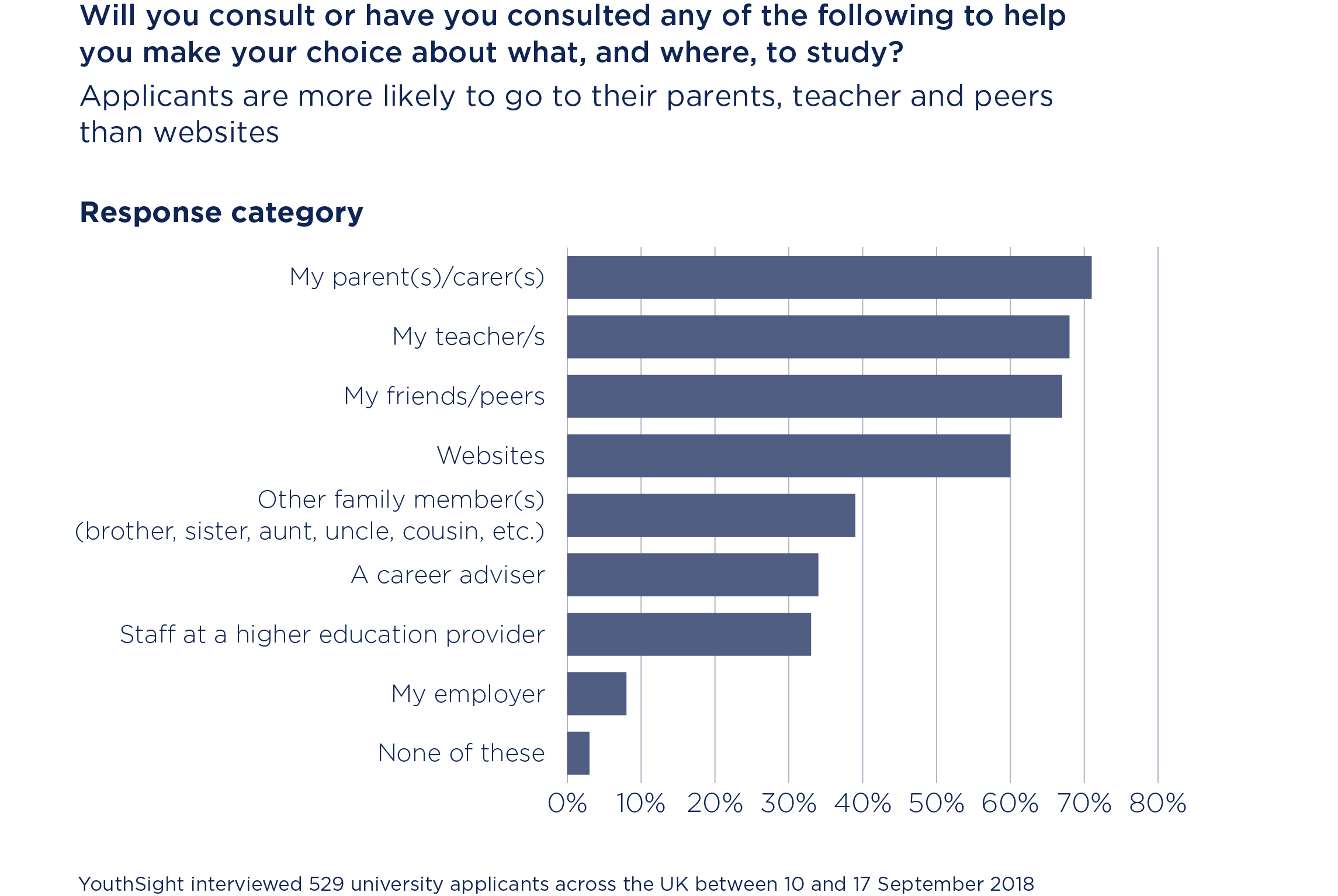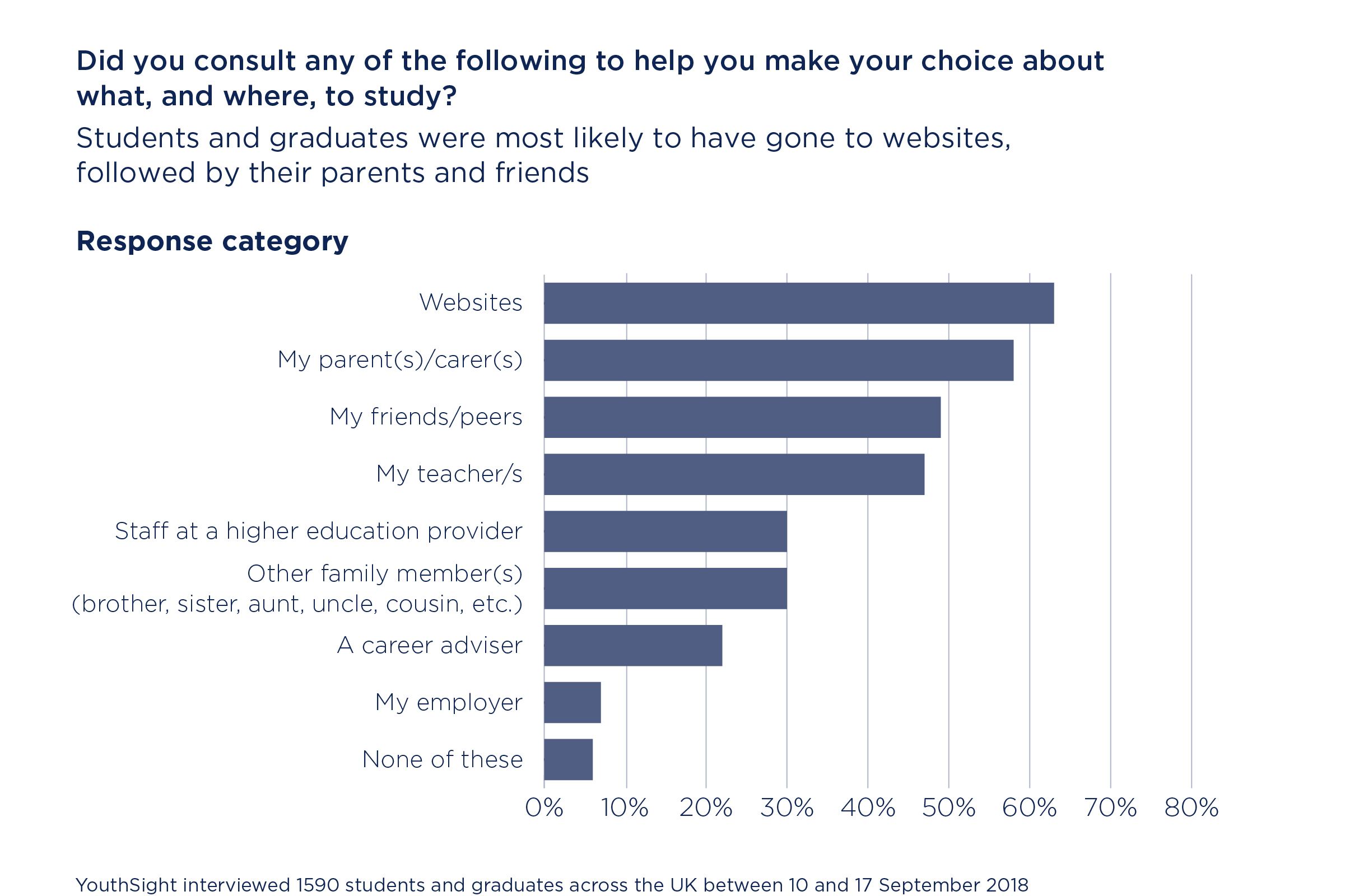Better support, better decisions, better outcomes
What does the evidence tell us?
Key messages
- It’s not just about what information is available. There is a lot of information out there, but students’ needs are not being met because they are struggling to make sense of it. They need help to find their way through the information and support to understand it in order for it to be meaningful. This means that a fundamentally different approach to student information is needed.
- It’s all about personalisation. Everyone arrives at their decision about higher education from a different starting point, with different motivations, criteria and preferences, and different sources of support. A little information can be too much and a lot of information can be not enough. Any solution has to be personalised to the individual’s circumstances and information needs if it is to be helpful.
We know that prospective students struggle to find what they need to make choices. We want to understand why that is and identify how we might improve things. It is essential that we base our approach on sound evidence. This is why we asked CFE Research to review the most up-to-date material on how people make decisions and engage with information (see note 1). We’ve also been conducting in-depth interviews and large-scale polling research with students of all ages and stages, talking to teachers, advisers, parents and other influencers, and drawing on the expertise and insight of our student panel. The evidence we have gathered gives us some important messages and will help to guide our work in this area.
A big decision
We’re hearing from students that they aren’t getting the support they need to navigate what is a complex network of information. Often they don’t feel well placed to make such a big decision, or feel anxious about making the ‘wrong’ decision. As the CFE report noted, ‘decision making about higher education is challenging because the higher education system is complex and there are lots of alternatives and attributes to consider’. Students need resources they can trust, and help to find their way through the information.
Too much information
There are a huge number of different things that you could consider when thinking about higher education. And as CFE emphasised, ‘there are limits to the amount of information processing that people can undertake’. Often when we’re faced with more information than we feel we can process, we just switch off because it is overwhelming. The solution is not to throw more and more information out there, but to support and empower people to find the information that is important to them and to make sense of it.
The supporters need support too
The majority of prospective students use internet resources to help them with their decisions. But we know that parents and carers are extremely influential and important in the decision making process. According to a recent Youthsight poll (see note 2), parents and carers are top of the list as a source of information for applicants about what and where to study. While 60 per cent of prospective students interviewed cited websites as a key source of information, an even higher proportion at 71 per cent said they would consult their parents.

For current students and graduates, websites were the most commonly cited source at 63 per cent but parents/carers were not far behind at 58 per cent.

We know from various pieces of research that prospective students also consult with other family members and friends, and those at school or college seek advice from teachers and, where available, careers advisers. CFE highlighted ‘the need for HE information providers to engage with those who influence the decisions of prospective students’. These important influencers also need support to understand the current higher education system and the options available, particularly in families where there is no experience of higher education.
We’re all different
People have different needs, priorities and goals, and their information needs are correspondingly diverse. What is critical for one person might be irrelevant for someone else. And, as the CFE report noted, ‘what might be considered a “best” outcome for one person may be not be optimal for another’. People also have different preferences for how much information they want and how they want to access it.
Some students need more help
It’s harder for some groups of prospective students to access and use information about higher education. Disadvantaged students often lack the information, advice and guidance they need, or don’t know what questions to ask; they are ‘more likely to have greater needs for support with using information’, the CFE work confirmed. Careers advice in schools and elsewhere is patchy – and sometimes non-existent. Mature students can be even worse off. It’s often the case that those students who would benefit most from good information are the ones least well placed to access and understand it.
Keep it simple
Because information on higher education is complex, people use mental shortcuts to make it easier, but this doesn’t always help. For example, someone might disregard some information because it conflicts with the impression they had previously. As well as this, information is often simplified to make it easier to digest, but this can mean it no longer gives the full picture. There needs to be a balance between presenting data in a way that is engaging – we know good data visualisation on web resources is extremely important – and ensuring it remains accurate and meaningful. As CFE notes, ‘it is a fine line to balance to ensure information is presented responsibly as well as accessibly’. Students also need more support to understand what the data can tell them.
Myths and misperceptions
Our research has shown that there are some unhelpful myths about higher education that can affect whether or not people consider it as an option, and what they think it will be like. Some are about the financial support available to students, which is obviously a critical element of the decision making process. These myths are affecting the advice parents and carers are giving to their children as well as limiting students’ own aspirations. As observed in the CFE report, ‘for students from lower socioeconomic groups, elite universities are seen to be “not for people like us”’. For the most part these misunderstandings have been created by what people see or read in the media, and there is a need to ensure clear and accessible information is made available in prominent ways to counter widespread myths.
Notes
- CFE Research 2018 ‘Student information use and behaviour’
- These results are based on a survey conducted by YouthSight with 2,119 participants in September 2018. The sample was split between university applicants (529), undergraduate students (531), postgraduate students (529) and graduates (530). In this case applicants refers to prospective applicants as well. All participants were members of The OpinionPanel Community, YouthSight’s proprietary research panel, comprised of over 140,000 members aged 16 to 30 including 80,000 students.
October 2018
Describe your experience of using this website
